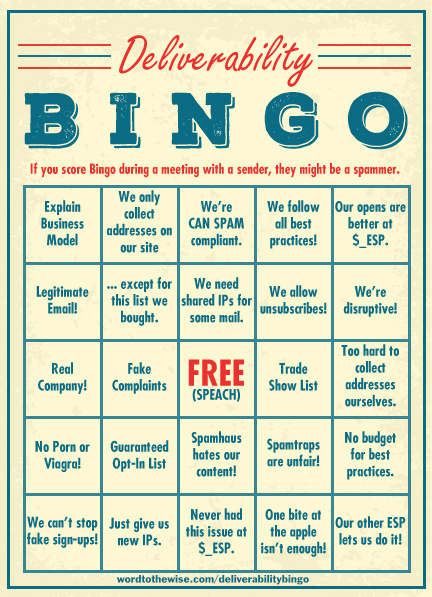Role accounts
A question came up on a recent deliverability panel about role accounts.
What is a role account?
A role account is an email address that goes to a particular role or position rather than to a person. In many cases email to that address gets sent to a ticketing system or sent to multiple people. Sometimes the address does go to a single person. The point of role accounts is to have standardized addresses that can be contacted at most domains.
Why do people use role accounts?
Businesses use role accounts for a number of reasons.
- To maintain coverage for certain addresses after hours.
- To provide one point of contact that can be passed on to different employees (on call pager).
- To maintain business continuity.
- To route email to the appropriate departments or people.
- To route email to ticketing systems.
Even businesses as small as Word to the Wise use role accounts. There are certain messages we value so much, we route those addresses to multiple people inside the company. Some sole proprietors also use role accounts to keep certain messages out of their personal inbox.
Why do many ESPs prohibit mailing to role accounts?
Because role accounts are about a position, not a person, it’s hard to guarantee there is permission associated with the subscription. In fact, even if one of the recipients opted in the role account it’s possible other recipients would see the mail as spam. It is true that some role accounts are used as personal addresses, but this is not the normal use case. On balance, blocking mail to role accounts minimizes spam complaints with very little collateral damage.
It’s not just ESPs that prohibit mail to role accounts. Some mailing list providers (Yahoogroups, for instance) prohibit adding some role accounts to accounts they host.
Yes, there are cases where role accounts are the right place to send bulk mail. Accounting mail between companies are the obvious use case. There are some small businesses that use role accounts to subscribe to lists and get business mail.
What if I need to mail role accounts?
Some ESPs allow mail to role accounts, if certain conditions are met. These conditions vary by the situation. If you’re in a place where some addresses are blocked. Be prepared to demonstrate your opt-in process and how you’re verifying the accuracy of the subscription. You may also need to submit samples of your emails and some justification for mailing the role accounts.
Different ESPs have different rules for granting exceptions. Some ESPs will not grant exceptions to their policies so you may have to find an ESP that better fits your needs.
Conclusion
Overall, role accounts are about email to a particular job function. These functions are not always good targets for marketing mail, particularly unsolicited marketing mail. This is why ESPs often prohibit mail to role accounts by default. However, as with everything in email there are some exceptions. If you have an exceptional issue talk to support or deliverability about your needs and if there are ways to alleviate their concerns.
